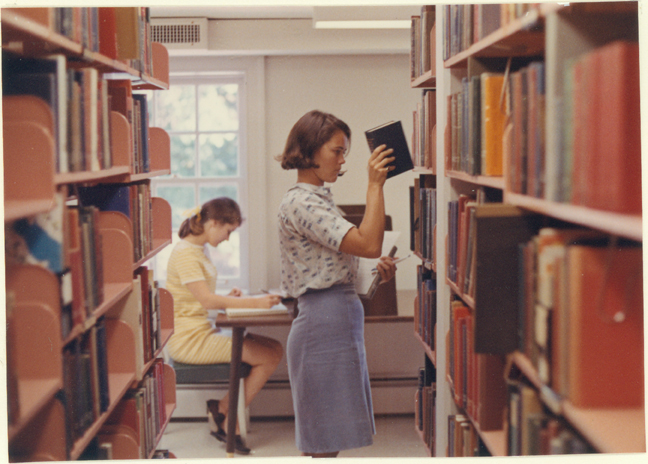
Sweet Briar student taking a book from the library stacks in 1967 (Mary Helen Cochran Library/Flickr).
Over the weekend, Virginia's attorney general announced that an agreement had been reached to keep Sweet Briar College open. The reversal comes three months after the College’s Board of Trustees voted to shut it down, citing "insurmountable financial problems.”
The ceremony this spring was supposed to be Sweet Briar’s last graduation, but now the school has another life, in part thanks to Tracy Stuart. She crossed that same graduation stage 22 years ago, and she also cherished her time at Sweet Briar.
“It’s sort of like a sisterhood is the best way to describe it, but it’s a really large sisterhood,” Stuart says.
In March, when the college announced on Facebook that it would shut down, Stuart and other graduates were so upset that they launched a campaign to save Sweet Briar.
“We did not feel that there was a clear understanding as to why they were closing the college,” Stuart says. “They cited financial difficulties, but given that our endowment was listed at $93 million when we learned of the closure, it just didn’t add up.”
So Stuart, who now works in real estate on Martha’s Vineyard, hired a law firm.
“I told them, ‘I’d like to sue my college,'” she says. “We just thought that there was an error that had been made and we wanted to right the ship.”
Stuart also enlisted a PR team and teamed up with a website to take pledges. It worked: over the past three months, "Saving Sweet Briar"raised more than $12 million, and convinced Virginia's attorney general that the college should stay open at least for another academic year. When the judge made the announcement this week, Stuart and other graduates were emotional.
“I’m not a crier, but I did,” Stuart says. “And it was just a really wonderful moment. We changed the face of Sweet Briar.”
While Sweet Briar graduates are celebrating a victory that will keep the college open, higher ed experts say there isn’t much to celebrate.
According to Brian Mitchell, former president of Bucknell University, the higher education system has some deadly flaws.
"We have an unsustainable financial model,” he says. “Colleges and universities cannot continue to finance themselves in the ways that they currently are."
Related: As Demand Dwindles, Can Small Colleges Survive?
He says as small colleges face dropping enrollment and skyrocketing costs there are several lessons to take away here, including how to be more open about financial challenges and communicate bad news.
“The bad news is going to continue for several years," says Mitchell. "So how do you lay out, in a world of social media, exactly what you're trying to do in a positive way when the story is a bad one?"
Since most students have already transferred, Mitchell predicts that Sweet Briar won’t be able to field an incoming freshman class that can actually support the school. To attract more students, Mitchell thinks Sweet Briar should distinguish itself in a crowded market.
Related: A Prescription To Cure Ailing Small Liberal Arts Colleges
"What is the difference between College X and College Y? All those colored, glossy brochures? They all look alike,” Mitchell says. “You swear they're the same kids on the cover of every college.”
According to Mitchell, the purpose of higher ed has changed, but colleges are slow to adapt.
“What they're arguing is that they produce a valued and educated citizenry. In the post-recession world of early 21st century America, that's not a sufficient answer anymore," he says.
For liberal arts colleges like Sweet Briar, the challenge now isn't just to stay open, but to stay relevant, and show how what they teach will help graduates be active citizens-- and get jobs.










